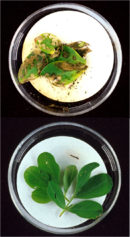Journal of Pest Science (2016) 89, 859-883
From Pestinfo-Wiki
Revision as of 21:30, 13 February 2017 by Bernhard Zelazny (Talk | contribs)
 | Selected publication you are invited to contribute to the discussion section (above tab) |
Behavioral effects of insect-resistant genetically modified crops on phytophagous and beneficial arthropods: a review
Journal of Pest Science 89 (4), 859-883
Abstract: Behavior is a main component of the survival and performance of arthropods. We have witnessed widespread adoption of insect-resistant genetically modified (IRGM) crops nowadays; however, no literature has reviewed the behavioral effects of IRGM crops on phytophagous and beneficial arthropods. In this review, we assessed the current information related to the effects of IRGM crops on arthropod behavior, mainly including locomotion (mobility, escape behavior and dispersal behavior), foraging (orientation, host plant selection/preference and feeding), mating, oviposition and other behaviors (associative learning). Almost all the studies have been conducted on Bt crops. The behavioral effects have been found in 54.2 %, 22 % and 33 % of the case studies on phytophagous arthropods, arthropod natural enemies and pollinators, respectively. Few behavioral studies have been documented on arthropod pollinators. The majority of cases reporting behavioral effects have derived from target phytophagous arthropods. Among them, locomotion and feeding behavior were the most frequently affected. For arthropod natural enemies, the cases using target prey/host in tri-trophic studies only accounted for a small proportion of behavioral effects observed on foraging behavior (host/prey selection). Overall, the effects through tri-trophic pathways on behaviors of natural enemies are limited. To conclude, while attention needs to be paid to several behavioral effects that may undermine the efficacy of IRGM crops in sustainable pest management, the behavioral effects generally do not disrupt the role of IRGM crops in achieving the goal of integrated pest management and crop production.
(The abstract is excluded from the Creative Commons licence and has been copied with permission by the publisher.)
Link to article at publishers website
Database assignments for author(s): Nicolas Desneux
Research topic(s) for pests/diseases/weeds:
biocontrol - natural enemies
Research topic(s) for beneficials or antagonists:
environment/habitat manipulation
Pest and/or beneficial records:
| Beneficial | Pest/Disease/Weed | Crop/Product | Country | Quarant. |
|---|---|---|---|---|
| Bacillus thuringiensis genes in crops (entomopathogen) |